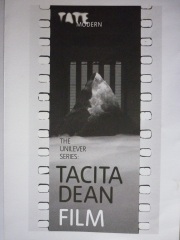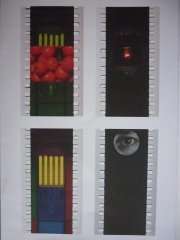All about creative documentary
-
João Moreira Salles talks about ‘Santiago’ – part VI
Posted by Martha Appelt · December 02, 2011 2:47 PM
The reasons behind ‘Santiago’
 In this film, there’s something from which you can’t run away, which is… It sounds like by talking about it, I’m defending myself from my tyranny, a cleverly narcissistic procedure almost… And because I’m talking about it, it’s as if everything is fine. I admit, therefore it’s as if I’m very brave.
In this film, there’s something from which you can’t run away, which is… It sounds like by talking about it, I’m defending myself from my tyranny, a cleverly narcissistic procedure almost… And because I’m talking about it, it’s as if everything is fine. I admit, therefore it’s as if I’m very brave.But it’s not like that, it’s not something that I’m proud of… even when I look at it today I feel embarrassed for having done something I didn’t quite realise I was doing, but I still did it. It doesn’t save me from anything; the film was made under those conditions. So by re-editing the film, not to show that I’m brave or to show what I did wrong – there is no bravery in showing what I did wrong when what I did condemned the relationship I had with Santiago. Now, that was the footage and that was the relationship, so if the film has to be made and if the first film failed because it didn’t show what actually happened, I only had two choices. I could either show what happened and expose myself to the critics of ‘He’s such a good guy for showing this, he’s redeemed himself, this film is a redemption, he saw the light, he’s almost a saint’.
-
João Moreira Salles talks about ‘Santiago’ – part V
Posted by Martha Appelt · November 23, 2011 3:10 PM
The Edit and Voice Over Choices

In this film we didn’t try to disguise the sound cuts. There’s always continuous dialogue instead. And another thing we don’t have is editing… I mean, there is association but not an obvious one, like, for example, someone saying: “I went to Montevideo.” Then you cut it with someone else saying: “Montevideo is a very beautiful city.” You start hooking these themes, which is a classic way of making documentaries; things go hand in hand and evolve through very obvious connections. In this film that doesn’t happen, instead, the themes change dramatically without the need to indicate it, and all the sequences happen in a single shot so when they’re over it’s a clear indication for the audience that there’s been a cut, therefore the film also tells the story of its own edit.
‘When I started talking in the first person the film started to exist’
Noe Mendelle: In contrast with Santiago’s voice, you then took the decision of using someone else’s voice, not yours. How do you explain this?
-
On building up trust and getting people to open up
Posted by Noe Mendelle · November 12, 2011 3:38 PM
The Cement City
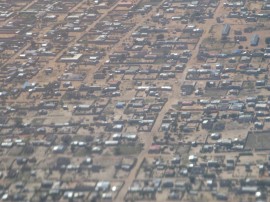 The Home Space project is based on a 20 year research on how the suburbs and land around Maputo is changing. The cement city aka Maputo city centre is like a fungus growing at the expense of the land around it. The suburbs around the city are mainly self-built dwellings, first out of bamboo now slowly being replaced by cement blocks and corrugated iron. At a time when land had no value, plots were given to poor people mainly dislocated during the war, to cultivate. Over the years families grew and so did poverty and plots got divided and sold off, often sacrificing the allotments where women grew the household food.
The Home Space project is based on a 20 year research on how the suburbs and land around Maputo is changing. The cement city aka Maputo city centre is like a fungus growing at the expense of the land around it. The suburbs around the city are mainly self-built dwellings, first out of bamboo now slowly being replaced by cement blocks and corrugated iron. At a time when land had no value, plots were given to poor people mainly dislocated during the war, to cultivate. Over the years families grew and so did poverty and plots got divided and sold off, often sacrificing the allotments where women grew the household food. -
João Moreira Salles talks about ‘Santiago’ – part IV
Posted by Ben Kempas · November 08, 2011 4:14 PM
Santiago and Memory

The film is very close to that sensation of celebrating nostalgia, which I think of as being the conservative idea that the past is better than the present, and that one needs to recover the past, which is impossible, so all that’s left is sadness and melancholy of the time that went past and the feeling you can’t invest in the present. From that you get the happiness of the past too. Nostalgia is necessarily melancholic and conservative. The past is better than the present and therefore, sometimes, better than the future… And I didn’t want to convey that in the film.
-
On working with foreign language
Posted by Noe Mendelle · November 05, 2011 4:25 PM
Do we need to understand every word to shoot a sequence?
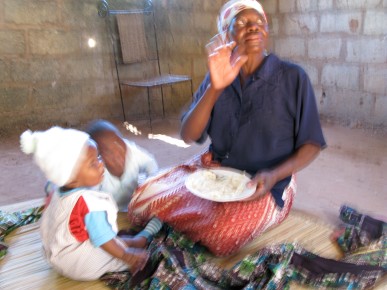
Mama Teresa was my favourite right from the beginning. She spoke a few Portuguese words but went on speaking to me in Changana, her local language. The energy she gave out seemed to allow me to understand what she was communicating. I have used translators in past situations but although we gain information through the translation, I often feel very frustrated because the attention, focus, keeps slipping from the character to the translator and part of me stops feeling the person that I’m filming. So I took the decision not to work with a translator and allow me to go with the feel of her and allow her to just talk to me, whenever she wants, knowing that I did not understand her. No doubt I will discover crucial details during editing and probably get kicked by my editor for not having followed some of the leads. But I ask myself: do we need to understand every word to shoot a sequence? Can’t we sometimes just work on the feel of it?
-
João Moreira Salles talks about ‘Santiago’ – part III
Posted by Martha Appelt · November 01, 2011 4:33 PM
Santiago’s freedom and the concept behind the film

This excerpt follows Noe Mendelle’s remark on this scene. She asked João if he thinks this was the only moment of the film where Santiago exercised his freedom.
Santiago told me once: ‘I find my hands very beautiful and I remember making these gestures as a child, like an exercise, whilst listening to Bach.’
And he asked me to do that in the film. So you’re right when you say that maybe that is one of the only moments in the film in which he’s exercising his freedom. To be able to do what he wanted to and be proud of it to the point he wanted it to be filmed. And he’s absolutely free and happy doing it, because it’s important for him and it’s beautiful.
-
On filmmaker's participation
Posted by Noe Mendelle · October 29, 2011 4:39 PM
Mozambique

A bank banner advertising a credit scheme in Maputo: ‘We will help you redecorate your home, invest in education, go on holiday and look after your health.’
Mozambique is a socialist country but with a privatised infrastructure, such as most education, electricity, water, transport etc… all except the land. So technically people get offered a plot of land but do not own it! The power of banks is only starting, as most people are self employed or do not earn enough to be paid through banks, unless you work for the government. Anything they save, they invest in developing their house: a few more cement blocks or cement bags or corrugated iron… With the privatisation of water, most people have a tap in their yard but many cannot afford it, so children and women will walk to a selling point and buy one jerry can at a time for 20 medicais (50 pence). The electricity is re-bought. They go to petrol stations or kiosks and have a primitive system of “pay as you go.”
-
Tacita Dean at TATE MODERN…
Posted by Noe Mendelle · October 28, 2011 5:07 PM
-
Wild at Heart: DokLeipzig 2011
Posted by Sonja Henrici · October 28, 2011 4:55 PM
Wild at Heart – An Experiment in Courage was an intriguing title for a novel industry event hosted by DokLeipzig this year. The intention with this invite-only event was to inject new life into industry conversations, which as festival events go, often end up in panels where we exchange information, but less frequently meaningful conversations of what actually underpins our passion for documentary, and reasons for doing what we’re doing.
The morning consisted of three rounds of 30mins, spread over 10 tables of 8, with a table host each, and three questions designed to get deeper into the heart of courage within documentary. We were told to write on the table cloths. Ilo von Seckendorff, one of the organisers, told me that it took a long time to find the right questions for this event. There were no right or wrong answers expected of us (although it was easy to fall into that mode of thinking), and participants were supposed to drop their roles as commissioners, producers, filmmakers etc and just be present as a person, contributing from the heart.
-
'Under the Surface' by David R Cairns
Posted by Noe Mendelle · October 27, 2011 5:13 PM
The film is about a series of suicides by young men in Dundee, during summer 2010 and how their families coped with such tragedy.
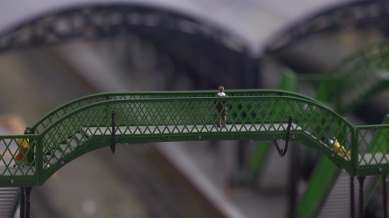
David R Cairns, the director, straight out of NFTVS, poured all his energy and sensitivity into listening to those families, absorbing their pain, and finding ways to translate it poetically so the film will walk the fine line of telling the harsh facts of reality, living in economically deprived Dundee while respecting their individual stories with enough feelings to go beyond the social worker case study, all this in 9 minutes!

